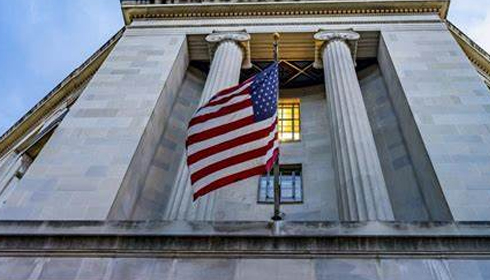
U.S. Justice Department Accuses Regeneron Pharmaceuticals of Unlawful Practices to Boost Profits
In a startling revelation, the U.S. Justice Department has levelled serious allegations against Regeneron Pharmaceuticals, accusing the company of engaging in unethical and unlawful practices aimed at maximizing profits. The accusations, detailed in a complaint filed in federal court in Boston, shed light on Regeneron's alleged manipulation of Medicare's drug-pricing process for its expensive macular degeneration drug, Eylea.
The crux of the issue revolves around Regeneron's purported failure to report substantial payments made to subsidize Eylea purchases, effectively inflating the drug's average sales price. These payments, amounting to hundreds of millions of dollars, were allegedly disbursed to reimburse drug distributors for credit card processing fees, ensuring their acceptance of credit cards from healthcare providers purchasing Eylea while maintaining lower prices for physicians.
The complaint asserts that these deceptive tactics significantly inflated the costs of Eylea to Medicare over several years, bolstering Regeneron's revenues at the expense of taxpayers. Acting U.S. Attorney Joshua Levy of Massachusetts condemned Regeneron's actions, emphasizing the detrimental impact on Medicare and the broader healthcare system.
In response to the allegations, Regeneron vehemently denied any wrongdoing, asserting that its reimbursement practices were lawful. The company pledged to vigorously defend itself against the charges, signalling a contentious legal battle in the days ahead.
This is not the first time Regeneron has found itself embroiled in legal scrutiny regarding Eylea. An ongoing lawsuit, initiated in 2020, accuses the pharmaceutical giant of utilizing a charity to provide kickbacks for the use of its drug, a claim vehemently denied by the company.
The latest case stemmed from a whistleblower lawsuit filed in 2020 by three former employees of Regeneron. Filed under the False Claims Act, which empowers whistleblowers to expose fraudulent activities targeting taxpayer funds, the lawsuit underscores the vital role of whistleblowers in holding corporations accountable for their actions.
The lawsuit underscores broader concerns about the pharmaceutical industry's practices and their implications for patient care and healthcare costs. It reflects growing scrutiny of drugmakers' financial manoeuvres and their potential impact on public health.
As the legal proceedings unfold, the case against Regeneron serves as a stark reminder of the need for robust oversight and accountability in the pharmaceutical sector. It underscores the imperative of safeguarding taxpayer funds and ensuring transparency and integrity in drug pricing and reimbursement practices.
With the stakes high and the allegations serious, the outcome of this legal battle will undoubtedly reverberate throughout the pharmaceutical industry, potentially reshaping regulations and enforcement mechanisms to prevent similar abuses in the future.